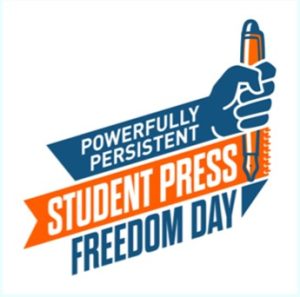On Thursday, February 22nd, 2024 the sixth annual Student Press Freedom Day will be held. Across the United States, students join together and embody the Day’s motto of “Powerfully Persistent” by raising awareness and taking action against the challenges they face. In doing so, they practice the fundamental ethics of journalism, including independent, accountable, and accurate reporting. Without these fundamental ethics, journalism would struggle to maintain credibility and authority in publications. An important characteristic of a journalist’s ethical code is their commitment to unbiased reporting from foreign influence.
Forming the most basic part of reliable, and ethical journalism, is the need for unbiased and independent reporting. Independent journalism, free from bias, gives reporters and large media networks credibility in their publications. This practice is mandated, and enforced by the vast majority of News corporations, such as The New York Times. The

New York Times’s “Handbook of Values and Practices for the News and Opinion Departments” bars their journalists from investing, receiving gifts, and having familial ties to companies or entities that they could, or are reporting on. In essence, this handbook opposes any form or potential form of bias that could influence the work of the journalist. This measure is taken to prevent biased content from appearing in the final publications of “The Times” and to maintain the organization’s credibility. However, without a personal sense of accountability or responsibility reporters are free to do as they please and may willingly (or unwillingly) let their biases influence their writing.
Enabled by the First Amendment, members of the press have the infallible right to report any subject or topic they desire. This moral responsibility of journalists to have personal accountability for themselves is commonplace among major media corporations to promote the spread of truthful information and maintain their credibility. A breach of accountability in the media’s reporting could result in damage to the corporation’s image and reputation. Additionally, if this ethical code is broken by media corporations or members of the press, false information can be decimated with relative ease and speed to ever-increasing portions of the population, causing biased, illegitimate, and false information to influence and take hold of individuals and important institutions. To combat this, journalists should hold themselves accountable for incorrect information by taking responsibility for their errors and fact-checking their publications before their release. Consequently, the personal accountability and responsibility of the press to present clear-cut, factual, and truthful information is necessary for it to retain its place of power and influence in our society.

The ability of journalists to compile reliable information originates from their inherent ability to pursue the truth as accurately as possible. A journalist’s fundamental ethic of truthful reporting influences the credibility and quality of their article. A well-researched and accurate article presents the reader with impartial information that is accurate and concise. Poorly researched articles have many factual errors and could be one-sided.
The ethics of journalism surpasses a basic moral code for journalists. Instead, they form the basis for a credible and influential press that provides factual information, is free from biases, and is accountable for their mistakes. As we celebrate “Student Press Freedom Day,” student journalists should unite behind the basic ethics of journalism.
Sources:
https://cs.stanford.edu/people/eroberts/cs181/projects/2010-11/Journalism/index16e4.html?page_id=24
https://ethics.journalism.wisc.edu/resources/ethics-in-a-nutshell/
https://imprimis.hillsdale.edu/the-evolutionand-devolutionof-journalistic-ethics/
https://www.nytimes.com/editorial-standards/ethical-journalism.html#
https://studentpressfreedom.org
https://ccnyintroductiontojournalism.com/2024/01/24/the-first-amendment/


